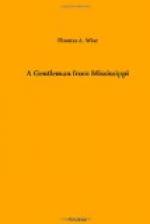“I do not think there will be any investigation,” he said, with decided effort, struggling to down the emotion that choked him. “I ask this house to listen to the following letter:
“DEAR SENATOR LANGDON: When you receive this letter I shall be well on my way to take a steamer for Cuba. I write to ask you not to think too harshly of me, for I will always cherish thoughts of the friendship you have shown me.
“Peabody and Stevens have finally proved too much for me. When they got old Telfer to swear to a forged contract and wanted me to forge your name in the land records at Gulf City, I threw up my hands. Their game will always go on, I suppose, but you gave them a shock when you broke up their Altacoola graft scheme. And I’m glad you did They cast me aside to-day, probably thinking they could get me again if they needed me.
“I am going on the sugar
plantation of a friend, where I can make
a new start and forget that
I ever went to Washington.”
Langdon paused deliberately. The Senate was hushed. The galleries were stifled. Not even the rustle of a sheet of paper was heard in the reporters’ gallery. The Mississippian gazed around the Senate chamber. He saw Stevens and Peabody craning their necks across the aisle and talking excitedly to each other.
Then he stepped forward and spoke, waving the paper in the air.
“This letter is signed ‘Charles Norton.’”
The old Southerner gazed triumphantly at the men who had sought to destroy him. It was with difficulty that the presiding officer could hammer down the burst of handclapping that arose from the galleries.
Senator Horton, however, was not satisfied with Langdon’s sudden ascendency.
“How do we know that that letter is not a forgery, a trick?” he exclaimed.
“Go get Congressman Norton—if you can—and get his denial,” responded Langdon.
The junior Senator from Mississippi hurriedly pushed his way out of the Senate chamber. His day’s work was done.
Down on a broad plantation along the Pearl River an old planter, who has borne his years well, as life goes nowadays, passes his days contentedly. He delights in the rompings of his grandchildren as they rouse the echoes of the mansion and prides himself on the achievements of their father, Randolph, who has improved the plantation to a point never reached before.
Sometimes he receives a letter from his daughter. Hope Georgia, now Mrs. Haines, telling him of her happy life, or perhaps it is a letter from Carolina, describing the good times she is having in London with the friends she is visiting.
And the old planter goes out on the broad veranda in the warm Southern twilight, and he thinks of the days that were. He remembers how the Third Mississippi won the day at Crawfordsville. He thinks of the days when he fought the good fight in Washington. His thoughts turn to the memory of her who went before these many years and whom he is soon to see again, and peace descends on the soul of the gentleman from Mississippi as the world drops to slumber around him.




